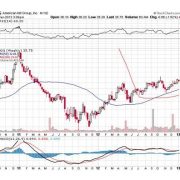The Bull Case for AIG
I was in a huge hurry last week when I sent out a Trade Alert to buy insurance giant American International Group (AIG), operating from a Chicago hotel suite with a stock market that was flying. Now that I am home, and have single handedly brought Oakland?s crime wave to a juddering halt, I have an opportunity to go into depth on this troubled company.
I know it well, as it originally started out in Shanghai to insure the once sizeable Jewish and white Russian community there. When the communists took over China in 1949, it moved its entire business to Japan. Its skyscraper just across the moat from the Imperial Palace still maintains a conspicuous presence on the Tokyo skyline.
Buy sun hats in the winter and snow boots in the summer. That?s the simple argument. The stock market equivalent to this is to buy insurance company shares in the wake of a giant hurricane, as we had with Hurricane Sandy in November. That?s because companies can jack up rates enormously after disasters such as these, just when the probability of another storm declines, to the benefit of the bottom line. Investment sage, Warren Buffet, figured this out 60 years ago, which is why he has carried major holdings in this sector ever since.
I picked (AIG) in particular because it has a whole raft of special circumstances. You may recall that the company went bust in 2009 after massively leveraged derivatives bets by its Greenwich, CT office went awry. Because it was feared that the extent of their bets would take down the entire global financial system, the Treasury stepped in with a whopping $183 billion bailout.
Much of this money went to European banks, and some $165 million was paid out as retention bonuses to the errant staff. It was the most despised rescue in the history of US financial markets.
I believe it was the single largest policy error of the Obama administration. Instead of honoring AIG?s obligations in full, I would have offered 50 cents on the dollar, which the creditors would have taken in a heartbeat at the time. But the new Obama administration had exactly a week to figure this out, with no time for research or analysis. When your ship is on fire and sinking, you don?t spend a lot of time figuring out what kind of fire hose to use.
In the end, the government made a $23 billion profit on the deal, dumping its last 15% share of the company in December. It was largely assisted by the bond market bubble, which panicked investors of every stripe to reach for yield, including that offered by the impossible to define garbage on AIG?s books. In the end, (AIG) turned out be to a gigantic, hyper leveraged call on the corporate bond market.
With the government out of its hair now, it is suddenly a whole new world for AIG. Investors had been avoiding the stock like the plague, as the ever present risk of a government unload was capping the share price. You only need 10 institutional investors to take 5% weightings each to soak up the entire government holding.
The company, which consists of its core U.S. life, global property and casualty, and U.S. mortgage insurance units, will now have to focus on turning around earnings at the property and casualty business, formerly known as Chartis. As a stand-alone entity, the investment case for (AIG) is really quite compelling. It is trading at a big discount to book, and is even a bigger bargain when compared to its insurance industry peers.
On top of this, the company is a big asset story. It still retains some securities that originally got it into trouble, which are marked at, or close to, zero. As these are sold out into a frothy bond market, huge profits will be realized. What we don?t know is how much money regulators will allow the company to take out of reserves to book in profits or pay in dividends.
As for the lawsuit just announced by former owner, Hank Greenberg, (which AIG has refused to participate in) claiming that the government paid an unfairly low price for the company, you can forget about it. This is more about salving an ego than pursuing a legitimate economic claim. If he had done a better job managing his risk, AIG would not have gone under in the first place. What is a fair price for an illiquid asset when the world is ending?
I Think I?ll Buy Some Insurance Companies




